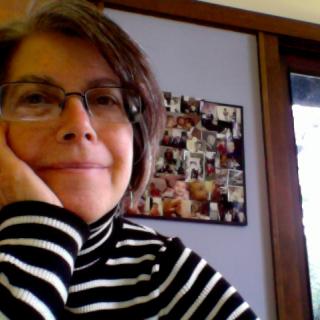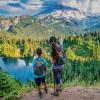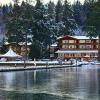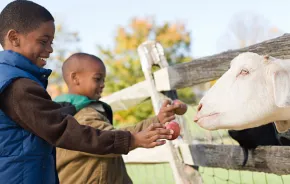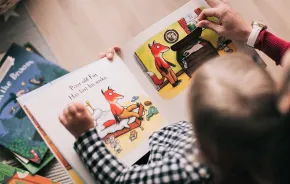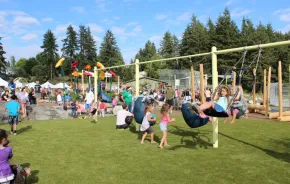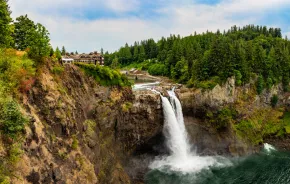 This may be the perfect season for kids (and perhaps parents, too) to discover the magic of opera. In collaboration with Seattle Youth Symphony Orchestra, Seattle Opera is producing an original trilogy of half-hour-long operas, called Our Earth, which will feature kids and are designed for kids.
This may be the perfect season for kids (and perhaps parents, too) to discover the magic of opera. In collaboration with Seattle Youth Symphony Orchestra, Seattle Opera is producing an original trilogy of half-hour-long operas, called Our Earth, which will feature kids and are designed for kids.
Each will premiere separately, on February 10, April 20, and August 1. The first, "Heron and the Salmon Girl," features a chorus of 50 local children ages 8 to 16.
What might kids gain from exposure to opera? And why commission an original Northwest-themed cycle? We asked three people closely involved in Our Earth — Sue Elliott, Seattle Opera’s Education Director, Our Earth's award-winning composer Eric Banks, and Kathleen Allen, Seattle Youth Symphony Orchestra’s Director of Education, Communication and Partnerships — to tell us.
What is Our Earth?
Sue Elliott: Our Earth is a series, or cycle, of three separate operas, each a half hour long, which together make a grand story, inspired by Pacific Northwest native culture and environments. The story follows a quest for missing salmon from the open marine environment of Puget Sound all the way upstream to a mountain watershed. It’s sung in English, but with two different native languages as additional inspiration. It’s a project of Seattle Opera’s Education department, in collaboration with Seattle Youth Symphony Orchestra (SYSO).
Why should opera be part of a child’s life? Or an adult’s, for that matter?
SE: Opera is one form of the all-important art of storytelling. Opera is really just a messenger. It can explore and celebrate and share any message. It doesn’t have to be long ago and far away to resonate. And like all art, it is about listening critically. One of the most important tools we can give our children is to listen critically.
Why the collaboration between SYSO and Seattle Opera?
Kathleen Allen: We feel like we have shared values, in valuing young musicians. Many of SYSO’s players go on to become musicians, but even for the many others who do not, it’s such a great skill to learn to work across disciplines. That interdisciplinary synergy is important to a young musician, but our alumni say it serves them in whatever they do.
Kathleen, you also have more than a professional interest going on, right?
KA: Full disclosure: I’m an excited Our Earth parent. My daughter’s in the chorus. These kids will not only be working with each other and with Seattle Youth Symphony and its great conductor, Stephen Rogers Radcliffe, but also with adult Seattle Opera singers.
What’s the message?
SE: It’s a story of things that are endangered. Animals. The Lushootseed language of the Coast Salish tribes, our region’s first language, which is used for some of the characters, is endangered. Even music teachers are endangered! And opera too, it’s an endangered art form. According to some, these things are part of what makes us a planet. And even though I love all the old operas, it was really important to ensure that it’s a living art.
So you commissioned a new opera, and it really is a living art! It’s not even finished as we speak, in early January, and your world premiere is February 10 at Town Hall?
SE: Right. The composer, Eric Banks, and the librettist, Irene Keliher, have completed the first one, “Heron and the Salmon Girl” and they’re in progress on the second and third. The middle one doesn’t even have a title yet! The third is called “Every River Has Its People.” Each will premiere separately, on February 10, April 20, and August 1.
Tell us about the people who are writing “Our Earth”?
SE: Irene grew up in the Suquamish reserve in Indianola. She’s incredibly adept at incorporating that culture in her work, and she had already written for young audiences before we engaged her for this. Eric Banks is an award-winning Seattle-based composer and conductor who has written a great deal of choral music. His extraordinary compositional voice matches the story.
Question for Eric: Why should Seattle parents, many of whom might be unfamiliar with opera themselves, considering sharing Our Earth with their children?
Eric Banks: This project has been truly inspiring. There were so many moving parts to include — endangered species, indigenous culture, various different Pacific Northwest ecosystems — not to mention keeping the story dramatic and moving swiftly for the attention span of 21st century children AND their parents. Irene (Keliher, the librettist) and I have compared this to creating something similar to a PIXAR film, but with live performers and without "cartoonery."
The story that we are creating over the course of these three operas is both relevant and beautiful. It involves a brother and sister (Parr and Litsa) who have the magical ability (from native stories) to change back and forth into salmon. There is a greedy fisherman (Tayil) who is desperate to find some fish, and cast of eight other animals (Heron, Raven, Owl, Frog, Turtle, Raccoon, Coyote, and Orca) who either help or hinder the siblings on their journey from the sound (in opera 1), along the river (opera 2), to the upper watershed (opera 3). These animals each also have their own characters and interactions with each other, based on native stories. There are many obstacles along the way, mostly hinging on humanity's relationship with nature, and the latter's ability to magical heal itself, most of the time. The story is chock full of familial devotion, intrigue, suspense, danger, and poetic justice.
The Nature Conservancy has a voice in this music too.
SE: Right, they suggested that we divide the story up to reflect three local environments: marine, freshwater, and forest.
The chorus is water?
SE: In opera 1 they are the ocean, undergoing a storm, or being an estuary; in opera 2, they’re rushing rapids. But in opera 3, they are the baby salmon trapped upstream by a mudslide.
Might the young singers in the Our Earth chorus find themselves part of a new Seattle Opera youth division, like the young dancers at PNB who find their way into The Nutcracker every year?
SE: Yes, our Seattle Opera Education Department envisions the preparation of singers for mainstage productions. The 50 young singers in Our Earth were chosen in open auditions from 40 different schools. The youngest is 8; the oldest, a 16-year-old girl. As you can imagine, part of our full-time youth chorus project will be working with boys whose voices are changing.
Will Our Earth have a life past August 3?
SE: Looking forward, the three Our Earth operas will for the next three years form the core of Seattle Opera’s “Opera Goes to School” programs.
If you go ...
"Heron and the Salmon Girl:" The first Our Earth opera will be performed on Sunday, Feb. 10, 2 p.m., at Town Hall Seattle. Tickets are $10 for youth under the age of 18; $18-$20 for adults. Buy online at seattleopera.org
Earth Day Celebrations: The second Our Earth opera will be performed on April 20 as part of an Earth Day celebration with Seattle Opera, the Seattle Youth Symphony Orchestra and The Nature Conservancy. Free admission.
Make Some Noise! Open House: An all-day operatic affair at McCaw Hall on Saturday, August 3, from 10 a.m.-3 p.m., will feature the complete Our Earth trilogy with Seattle Youth Symphony Orchestra and Seattle Opera soloists and Youth Chorus, including the premiere of Every River Has Its People, the third and final opera in the series. Families can also learn creative ways for making noise, making music and exploring the science of sound.
 About the author: As a local radio host, Seattle writer Gigi Yellen has shared classical music with listeners to KUOW and Classical KING FM.
About the author: As a local radio host, Seattle writer Gigi Yellen has shared classical music with listeners to KUOW and Classical KING FM.




